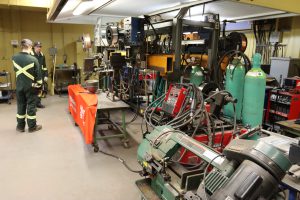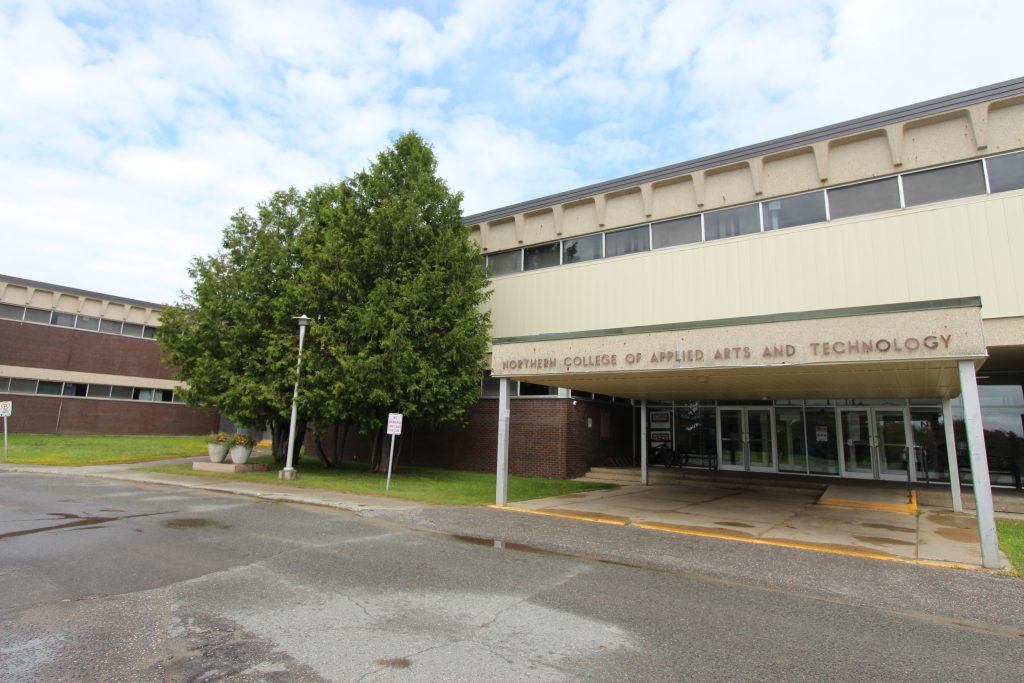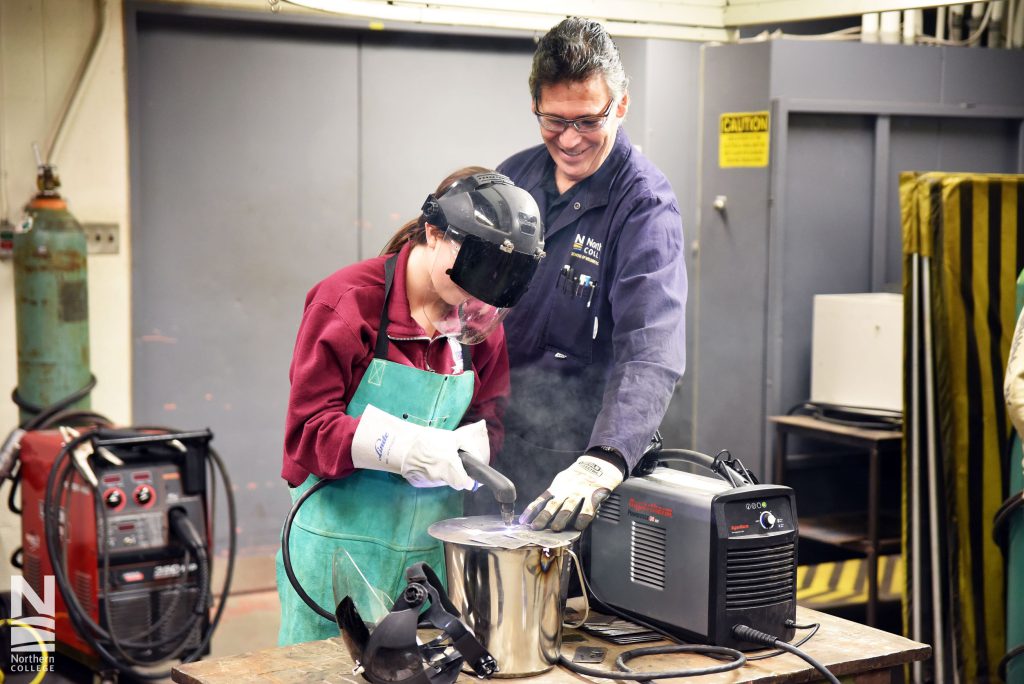Student Success & The Northern Experience

“The professors at Northern are some of the best I have met. Tyy and Tim are there to help you with whatever questions you have and give you the best education possible. They are there to turn you into the best welder possible. The course content taught will directly relate to the work you will preform in the industry, from the welding theory and weld skills classes to blueprint reading. I liked it especially cause the professors take their time to help with any questions and give you the best explanation possible.”
Dom P.
Welding Fitter Graduate
Does this program sound like a good fit for you? Connect with us to learn more.
Course Information
2024-2025 Academic Year
Semester 1
A required course in the first semester of the Mechanical Techniques – Industrial Millwright, Motive Power Technician – Automotive Service, and Heavy Equipment Techniques programs at Northern College, Communication Fundamentals will provide students with an opportunity to reinforce their use of Standard English, develop their abilities to communicate effectively in the workplace and improve their capabilities with computer technology, particularly in using Word, Excel and Alldatapro to produce accurate and professional documents. As well, students will be required to use information technology like Blackboard and their own computing devices to research information online to learn about their trade pathway, find technical information using an industry system like Alldatapro, and to complete course assignments.
28 Hours
This course introduces the student to health and safety in their home, in society and within an occupational setting. Students learn about the social and personal benefits of safe work practices and the methods to best prevent accidents or injuries. Students will review the role, right and responsibilities of an individual in today’s health and safety conscious world. Students also learn how to read and interpret the Occupational Act and Regulations.
42 Hours
To Be Updated
42 Hours
The Mathematics & Precision Measurement I course for the Mechanical Technician – Welding Fitter program consists of trade related mathematical problems and their solutions. The course begins with a review of essential mathematical concepts required in a variety of trade-related practices and applications and moves into a introduction to precision measurement tools. Early concepts include a brief review of BEDMAS, averages, and estimation and then study units deal with fraction, decimal, and percent uses relevant to work carried out in the workplace.
30 Hours
In this introductory course, students will develop the ability to draw, sketch, read, and interpret engineering drawings and schematics similar to those found in the machine or welding fabrication industry. The course introduces students to structural steel shapes as well as basic layout and fitting techniques. Topics include: basic drafting skills, shape description (orthographic and pictorial), sections, structural steel shapes, sketching, layout, fitting, joint design and welding symbols.
60 Hours
Students will describe the function and controls of welding power sources in accordance with safety regulations and approved industry standards, and will be introduced to the fundamentals, equipment requirements, and characteristics of the welding processes: SMAW, GMAW, FCAW, MCAW, and GTAW.
60 Hours
This course examines various perspectives of abnormal psychology. We seek to understand the nature, causes, and treatment of abnormal behaviour. Several theoretical viewpoints will frame our discussion of abnormal psychology. The patterns of abnormal (maladaptive) behaviour to be examined are: behaviour and emotional disorders of childhood and adolescence, eating disorders, substance-related disorders, anxiety disorders, dissociative and somatoform disorders, personality disorders, mood disorders, and schizophrenia. Students will also study treatment strategies and mental health law in Canada.
To Be Updated
132 Hours
This practical skills course begins with an introduction to welding safety. Students are provided an opportunity to learn the basics of oxy-acetylene welding and cutting, including assembly and disassembly. Shielded Metal Arc Welding (SMAW) and Flux Cored Arc Welding (FCAW) are also introduced at a basic level.
48 Hours
Semester 2
This course is required in the second semester of the Motive Power Technician – Automotive Service, Heavy Equipment Techniques, Motive Power Technician – Heavy Equipment and Mechanical Technician and Techniques – Industrial Millwright and Mechanical Technician – Welding Fitter trades programs at Northern College. The purpose of this course is to give students an opportunity to develop and enhance basic communication skills as required in the workplace. Students will also be required to use a computer to complete assignments and other course work, work independently and collaboratively, follow instructions and complete assigned tasks on time.
28 Hours
Improving your knowledge and understanding of the history of the Indigenous peoples of what we now call Canada is an important step to enable Indigenous and non-Indigenous people, organizations, and communities to work together more respectfully. Throughout this course you will have the opportunity to learn, discuss and reflect about many topics that are relevant in the learning journey towards reconciliation.
42 Hours
The Mathematics course consists of trade related mathematical problems and their solutions. Realistic mathematical problems in welding and fabrication are used to strengthen both mathematical and technical skills. The student will be required to keep pace throughout the course and tests must be written on the specified dates. Adequate notification of all tests will be given.
30 Hours
This course describes the various methods Interpret blueprints, produce basic drafting drawings and bills of materials in accordance with government safety regulations, manufacturer’s recommendations and approved industry standards. The course will familiarise the student with information typically found in manufacturing manuals. It will enable them to determine specifications, and identify drawing symbols, as well as draw and sketch using orthographic, isometric and sectional views. There will be an introduction to welding symbols. Students learn the use of computer aided drafting with hands on practical with the latest version of AutoCAD.
60 Hours
This course will cover the terms code, standard and specification. The student will learn the advantages of standardization; identify the agencies that set codes and standards; identify and understand codes governing welding in Canada for structural steel, boilers and pressure vessels, piping systems, pipelines and transmission systems, and storage tanks. The student will be able to understand and follow welding procedure and performance qualifications.
30 Hours
In accordance with safety regulations and industry standards, this course provides a working knowledge of brazing of deoxidized copper with oxy-fuel equipment, characteristics of metals and their alloys, classifications and effects of welding, and the functions and application of destructive and non-destructive testing methods for welds.
60 Hours
Students will advance their knowledge in the use of the SMAW, FCAW and GMAW processes by applying it to welding in all four positions: flat, horizontal, vertical and overhead, and will complete bend tests, and tests for all CWB test coupons. Students will learn all aspects of the use and set up of the GTAW process and use these on the following materials: mild steel, stainless steel and aluminum. Students will perform the safe set up, operation and correction of common cutting faults for the PAC and CAC-A processes.
180 Hours
Semester 3
The Mathematics course for the Mechanical Technician – Welding Fitter consists of trade related mathematical problems and their solutions. Realistic mathematical problems in welding and fabrication are used to strengthen both mathematical and technical skills.
44 Hours
Students will demonstrate the basics of programming for robots with CNC custom macros, and will understand and apply G&M codes used in some automated systems. Students will understand and apply methods used in programming automated cutting equipment and welding equipment.
44 Hours
Students will apply their knowledge to the welding of open joints such as high pressure pipe, and will work on using the walk-the-cup technique for tig welding on pipe. They will use the method of destructive testing to test the quality of the weld, and will learn how to minimize distortion by welding around the neutral axis of a weld joint; and will learn to program and run programmable cutting equipment. Students will contribute to the completion of a welding manufacturing project.
114 Hours
Students will understand and use common non-destructive inspection techniques and equipment: visual, dye penetrant, magnetic particle, ultrasonic and radiographic examination. The students will demonstrate a basic proficiency in the use of visual, dye penetrant and magnetic particle inspection. Students will develop knowledge of jigs and fixtures to control distortion and to ensure multiple parts dimensions remain consistent.
44 Hours
In this course, students learn the advanced use of computer aided drafting using the latest version of AutoCAD. This course also describes the various methods of presenting information on drawings, methods of estimating material requirements for weldments and fabrications, and various layout techniques. Students will complete classroom and shop projects involving drawing, layout, and fitting.
44 Hours
Career Ready Graduates
Articulation Agreements
A number of articulation agreements have been negotiated with universities and other institutions across Canada, North America and internationally. These agreements are assessed, revised and updated on a regular basis. Please contact the program coordinator for specific details if you are interested in pursuing such an option.
- Complete all work in compliance with current legislation, standards, regulations and guidelines.
- Apply quality control and quality assurance procedures to meet organizational standards and requirements.
- Comply with current health and safety legislation, as well as organizational practices and procedures.
- Apply sustainability best practices in workplaces.
- Use current and emerging technologies to implement mechanical and manufacturing projects.
- Analyze and solve mechanical problems by applying mathematics and fundamentals of mechanics.
- Interpret, prepare and modify mechanical drawings and other related technical documents.
- Perform technical measurements accurately using appropriate instruments and equipment.
- Manufacture, assemble, maintain and repair mechanical components according to required specifications.
- Contribute to the planning, implementation, and evaluation of projects.
Career Opportunities
Mechanical Technician – Welding Fitters install, repair and maintain a variety of machinery and are vital to various plant operations. The Mechanical Technician – Welding Fitter may find employment in the mining, manufacturing, steel, construction and hydro industries, as well as various others.
Admissions Information & Requirements
Program Specific Requirements
Welding Programs: Required Equipment (PDF, 164 KB)
Admission Requirements
- Ontario Secondary School Diploma (OSSD)
- Grade 12 English (C, U)
- Grade 11 Math (C, M, U)
Or equivalent
Academic prerequisites for this program may be obtained free of charge through Academic Upgrading.
Applicants who do not have a high school diploma or equivalent and will have reached the age of 19 years on or before the start of the program must undergo academic testing and may be required to complete Prior Learning Assessment & Recognition (PLAR) process to demonstrate equivalency of admission requirements prior to admission into a program.
For more details, please contact the Admissions Office at 705-235-7222 or admissions@northern.on.ca.
Additional Requirements for International Students
In addition to the admission requirements, international students must have proof of English Proficiency and meet the requirements below.
1. Proof of Senior High School Diploma/Certificate
2. English Proficiency (we will require one of the following):
- IELTS Academic International English Language Testing System a minimum overall score of 6.0 must be achieved with no individual band score under 6.0; however, we will accept one band at 5.5.
- TOEFL (Test of English as a Foreign Language) – Internet Based Test (iBT) overall minimum score of 79
- PTE (Pearson Test of English) Academic – Graduate Diploma: 58+
If your country of citizenship has English as its official language, we may accept alternate proof of English Proficiency.
All educational documents must be submitted in English and will be dependent on the country of citizenship.
For more information, please contact admissions@northern.on.ca.
Tuition, Fees & Payments
The tuition and fees information is typically updated yearly for the upcoming Academic Year in May. The amounts are for the full academic year.
Amounts may be based on last years tuition and fees and are subject to change.
If you are a current student, please refer to your Student Account or see a Student Services Clerk for the most up-to-date information.
Tuition
Domestic: $5,441.10
International: $25,853.00
Ancillary Fees
Ancillary fees are paid in full for the entire academic year in the first semester.
The Convocation and Official Documentation Fee (GRA) of $100.00 only applies for the first year of each program.
Please see Detailed Ancillary Fees for more information.
| Ancillary Fees by Campus | Domestic | International |
| Kirkland Lake (KL) | $909.50 | $1,522.00 |
Find Your True North.
At Northern College, you’re a part of a community.
From your teachers to support staff and administrators, we are all here to help you get an education and make some lasting connections along the way.
Your success is incredibly important to you, so we provide student supports to help you achieve your goals. From study assistance and accessibility services to mental health supports and financial aid, we’ve got you covered.
Each of Northern’s campuses boasts exercise facilities, a gym, cafeteria, study areas and a library – places that you can go to help keep you focused as you work your way through your studies. The communities we call home are incredible places, filled with amazing people and things to do.


Does Northern College sound like a good fit for you?
Here’s how to take your first steps on your new exciting and rewarding career path.
